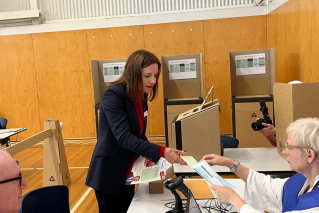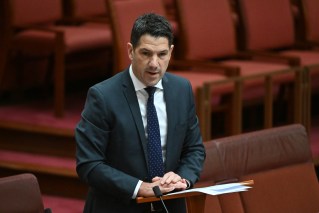The ‘archaic’ law forcing sex workers onto the streets

Australian banks stand accused of discriminating against sex workers.
Supporters of sex workers say lives would be saved if state governments around the country cast aside “outdated” anti-prostitution laws and decriminalised sex work.
The claims came at a rally on the steps of South Australia’s Parliament House last week, where sex workers and parliamentarians united to give momentum to a push to decriminalise prostitution.
South Australia is one of several states and territories where most forms of sex work remain criminalised, along with Western Australia, Tasmania and the Northern Territory.
• Stephanie Scott murder: rape charge for suspect
• More jail time for Jill Meagher’s killer
• Thousands rally for same sex marriage bill
Dozens of attendees at the annual rally, timed to coincide with International Sex Workers’ Day, heard from industry representatives and speakers from across the political spectrum, who argued that outlawing the practice left sex workers without basic workers rights, union representation or superannuation, and pushed them into dangerous situations.
Deputy Leader of the Liberals in the state’s Legislative Council Michelle Lensink told the assembled supporters that the Sex Work Reform Bill set to come before State Parliament this year had multiparty support.
“Our party will have a conscience vote on this issue,” she said.
“There is a coalition of women across different parties – a bit like what is happening in the Federal Parliament right now with gay marriage – to get these laws changed.”

Advocates of legalising prostitution in South Australia say the issue is a higher priority than gay marriage.
One of the people at the rally, a male prostitute who wished to be identified by his street name Joel, told The New Daily he felt much safer working in NSW, widely regarded to have the most liberal sex work laws in Australia.
“In that system you feel comfortable going to the police if there is a problem,” he said.
“Sex work has been happening for centuries, so why wouldn’t you decriminalise it to keep it safer?”
Joel expressed dismay that social issues such as gay marriage seemed to be a hotter topic than decriminalising sex work.
“What’s more important, the lives of sex workers or the ability of gay couples to get a combined superannuation, it’s just weird,” he said.
Labor backbencher Steph Key, who was also at the rally, has introduced bills attempting to decriminalise prostitution every year since 2012, but opposition remains widespread.
Leading the resistance is Family First State Parliamentary Leader Dennis Hood, who told The New Daily that while advocates for decriminalisation have good intentions, they are misguided.
He said his party is currently investigating the “Nordic Model” of criminalising the purchase of sexual services as opposed to targeting the seller, an approach backed by groups such as the Coalition Against Trafficking In Women Australia.
“Despite argument to the contrary, the truth is that prostitutes are more likely to be drug addicts, to suffer serious health problems, to be victims of violence,” he said.
“The simple fact is wherever prostitution was decriminalised it resulted in proliferation – there is no good reason to change the law that will proliferate such activities.”

NSW has the country’s most liberal prostitution laws. Photo: AAP
Mr Hood said he based his argument that decriminalisation would lead to an increase in sex work on the experiences of New Zealand, where laws around prostitution were relaxed over a decade ago.
He was not able to cite any evidence that sex work there increased in the wake of decriminalisation, however, and the available data appears to contradict that claim.
In 2008 the New Zealand Prostitution Law Review Committee analysed the repercussions of the decriminalisation laws passed five years earlier, and found the number of sex workers had not increased in New Zealand as a result of the new laws.
Long-time advocate for sex workers, Tammy Franks of the South Australian Greens, was another to speak at the protest, and told the assembled onlookers she would invite members of parliament to New Zealand to see what she described as the better health outcomes of decriminalisation.
Ms Franks dismissed the “Nordic Model” as a prohibition approach that punished the sex worker by default, even if it targeted the customer rather than the seller.
She argued that the murder of sex worker Ting Fang in an Adelaide hotel room earlier this year was a prime example of how leaving prostitution unregulated put women in danger.
“She was silenced by her death, but she was silenced even more by her profession, cloaked in secrecy,” Ms Franks said.
“Fang deserves justice, she deserves South Australia to take that step forward and decriminalise sex work this year.”








